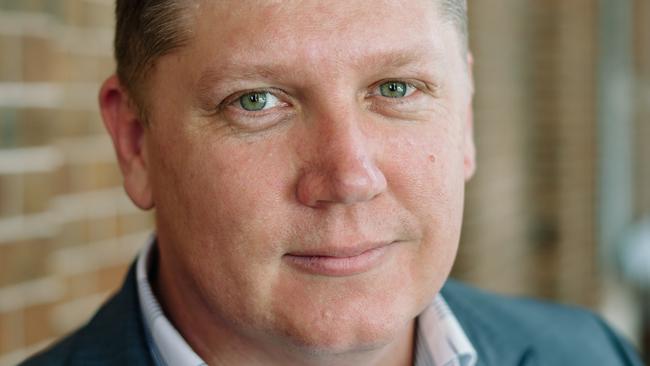The Great Resignation: Millions of Aussies predicted to leave jobs
A trend called the Great Resignation is happening across the US, with staff from all types of industries leaving their jobs – and “exhausted” Aussies could follow.
Work
Don't miss out on the headlines from Work. Followed categories will be added to My News.
Sandra Knowles* sees resigning from her senior leadership role at a major bank, where she earns a six-figure salary, as leaving an “abusive relationship”.
She is one of millions of Aussies expected to quit their job in the coming months as part of the Great Resignation – a phenomenon currently playing out in the US.
In August alone, 4.3 million people in the US left their jobs, according to the Job Openings and Labor Turnover Survey, and it includes everyone from frontline workers to senior executives.
Then there’s Microsoft research that revealed that 40 per cent of the workplace globally is considering bidding farewell to their employers this year.
Ms Knowles has been with the bank for over a decade and said her managers will be shocked when she resigns as they would have marked her as a “lifer”.
The mother-of-one told news.com.au that during the pandemic she had worked “harder than ever before” as she dealt with endless Zoom calls and addressing new customer problems, all while the company expected growth plans to continue.
“I worked my first all-nighter in my career. I was at my desk from 8am to 8am. I worked 60 to 70-hour weeks for three months and I was not really rewarded or recognised for that at all,” she said.

Even after the first Sydney lockdown, Ms Knowles said she feels like she has been doing the job of multiple people with little thanks.
“On top of that, I think the major painpoint I have is the way that people treat each other,” she said.
“There is a culture that I have just accepted for my whole life on how people make me feel in the workplace and I’ve determined I won’t accept that anymore. I don’t even have a job to go to when I resign.
“I’m investing and I’m prioritising in my mental health and my physical health. It honestly feels like I’m just coming out of this abusive relationship and I’ve been gaslighted and there is a better world and I can finally see it.”

Big warning for Aussie employers
The Great Resignation is a trend that should be a “massive scare” for Australian employers, according to behavioural scientist Aaron McEwan from global research and advisory firm Gartner.
He said some research shows that up to three in five Aussies could be looking to change jobs.
“We have just seen record levels of people changing jobs in most markets, particularly in the US, so its probably one of the largest movements of talent that we have seen in living memory,” he said.
“It’s quite a phenomenon and it has lots of leaders and heads of HR very concerned about what that means. But I think the smart companies are looking at a huge opportunity and if you’re treating your employees badly it’s probably a massive scare.”
Mr McEwan said the pandemic had given people the opportunity to reflect on what’s important to them as their world largely shrunk to their immediate family, local area and home.

‘Pretty exhausted’
Some also described the move into working from home as “like sleeping in the office” and found there was no escape from it, Mr McEwan said.
“What we did notice about work is it got really hard so people are pretty exhausted and a lot of that is because we didn’t necessarily redesign our work to suit the virtual or hybrid environment,” he said.
“We found ourselves still trying to work like we are in offices but whilst doing it in homes, so productivity and performance went up but the broad-lasting impact is people are exhausted and work is inescapable.
“The other thing is groundhog day. So for many people, particularly knowledge workers, they might have been travelling a lot for work or visiting people in different offices, so days are broken up by lots of different activities.
“That was replaced by one long Zoom call that went for 12 hours a day so every meeting was the same … so this has prompted a desire for change and variety.”

March madness
The Great Resignation will really start to bite in Australia come March next year when people have gotten their Christmas bonuses and recruiting starts to gear up again, Mr McEwan predicted.
He believes a lack of flexibility will be a huge factor in people’s decisions to ditch their employers if they are “forcing them back into the office” after working from home for months.
This is what happened to Susan Gray* who spent more than 200 days in lockdown in Melbourne last year only to be told to suddenly come back into the office full-time – despite her welfare never being checked on during the isolating time, she said.
She earned a six-figure salary working for a federal government department and wanted to be consulted about returning to work, rather than just being told what to do.
“It was like it’s over now, come back in and that’s an extremely toxic thought and our stress levels skyrocketed,” she said. “We can’t go back to working 9 to 5 right away.”
The 36-year-old quit her job recently with nothing to go to, although she has a side hustle to keep her busy.

On her job hunt, she is happy to take a pay cut, but wants flexibility and a healthy culture that supports people – where workers are asked what they need from a staffing point of view, education, tools, training and career development.
“I think what the pandemic did is it allowed people time and space to breathe for a second and lose all the distractions. So they weren’t running from one appointment to another and then going to get the kids and working eight mandatory hours inside the office and then getting groceries and cooking dinner,” she said.
“It was largely based in the centre of home and based around the people you love and then you saw that your employer is not talking care of me and not supporting me.”
Overworked staff
Another risk for employees fleeing is not filling vacancies, pushing more work onto already overloaded staff, Mr McEwan said.
Recent research has found nearly one-fifth of Australia’s essential workers in education, emergency services and healthcare have considered quitting their jobs because of the pandemic.
This represents around 760,000 essential workers across Australia who could be at risk of leaving their frontline profession, and would lead to already stretched professions moving closer to breaking point.
Interestingly, Mr McEwan added that money doesn’t top the list for Aussies when considering a job move either, but cashed up companies are going to make competition fierce. Simply put, people want to be less busy.

“All data shows that what employees want is they want flexibility and they want a reasonable workload,” he said.
“What I think this is going to lead to interestingly is a lot of companies won’t be able to compete with the money that is being offered, so as a counter offer may be a four-day week or a nine-day fortnight.
“They can’t afford to give you an extra $100,000 but what if you stayed on your current package but work four days a week? I think the conditions are almost set up for things like a four-day week or those types of different work models to accelerate.”
It’s something Ms Knowles feels keenly. She said she will happily take a pay cut of at least $60,000, but is looking for a flexible workplace.
A four-day week particularly appeals, so she isn’t a “slave to the system”, but she also wants a supportive culture that consists of “respectful disagreement” and “care and kindness even in conflict”.
Show me the money
But that’s not the case for all Aussies. Sandra Wong* recently resigned from her marketing job of three years because it was not competitive in terms of pay or career progression.
She hadn’t had a pay rise the whole time she had worked there and the company paid less than the industry average, she said.
“They rely on work-life balance and flexibility, however, post-Covid that will be the norm so there’s nothing standing them apart now from competitors,” she said.

While bonuses also made the organisation an attractive place to work, for the past two years it’s only been at 50 per cent of the max they could earn and even at record profits only 90 per cent was paid out.
“I think people have been waiting to collect their bonuses which were paid out in September, and there will now be a mass exodus,” she said.
Companies will need to find new ways to stand out from competitors in order to attract and retain talent, she said.
“I think a lot of people have stuck it out through Covid and working from home, but now that we’re returning to some normality, people will look for a change and possibly for a company that will value them more for all the work that they do,” she said.
Mr McEwan said employers have to look to treat their employees like humans – so they want to know what their employer can do to enrich their life experience, rather than just focusing on a good office, salary and benefits.
Mr McEwan said there is a shift as well with HR departments turning into PR machines to try to woo staff.
He gives an example from Canva’s founders, which recently announced they would donate billions to charities – a way to show staff they are working for a value-driven organisation that cares about the world, he said.
“Employees that continue to be on a hamster wheel where they haven’t been treated particularly well and haven’t been thanked for their sacrifices and where their workplaces are not looking at changing anything – those employers should be worried,” he said.
“If they are asking employees to come back to the office three or four days a week and then they are comparing that to what they are seeing in market, no wonder people are changing their jobs.”

Lack of recognition also seems to be a major factor playing out in Aussie workplaces.
Ms Knowles’ colleague recently quit when he was approached by another employer on LinkedIn.
He jokingly said he wanted a quarter of million of dollars for his salary and when his request was taken seriously he realised “he wasn’t valued” and he’d had enough after slaving away for long hours.
The grass isn’t always greener
However, Emma Brown* warns people to be careful what you wish for after her experience.
She quit a federal government job after the department was restructured without consultation and the backlog of complaints she was tasked to deal with grew to hundreds during the pandemic as distressed Aussies lashed out at her.
The Brisbane woman moved to a job at a university a few months ago and regrets it, encountering a culture of power plays, “point scoring” and a lack of respect.
“The decision was definitely a knee-jerk reaction to the impact of Covid-19, and not a smart career move. I lost all my benefits of service in the public service, and the new role has so much required inherent knowledge, and there are internal politics and entrenched behaviours that I have not encountered before,” she said.
“Also the benefit of working that I am used to, having been in the public service for so long, do not apply at the uni role, for example flex time and purchased leave.”
She said she was “seduced” by a higher salary and larger super contributions but has realised she can’t stand the bad culture and lack of job security.

The woman, in her 50s, is currently job-hunting and would love something new before Christmas.
“I’m not looking to … climb the corporate ladder. I want a job with people that is meaningful and not where I get rewarded just monetarily,” she said.
“I’m in a position where I’m not worried about financial gain – it’s about working in a nice environment, with nice people that behave well.”
But Mr McEwan adds the Great Resignation phenomenon will happen for the privileged percentage of the workforce who are gainfully employed and are feeling financially secure because they kept their job during Covid.
“If they’re one of those privileged knowledge workers, it means they are in a pretty good position to make bold decisions,” he said.
“Another massive percentage of the workforce are fearful for their jobs and if freedom doesn’t go as planned, then this doesn’t apply to everyone.”
*Names have been changed
Have you quit your job or made a major life change this year? We want to hear from you sarah.sharples@news.com.au
Originally published as The Great Resignation: Millions of Aussies predicted to leave jobs





